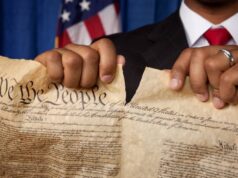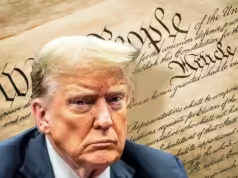Our president was just impeached with two baseless articles of impeachment passed solely with the votes of hyper-partisan Democrats. The Senate will make quick work of rejecting these articles of impeachment and will do so with the contempt that these articles merit.
So the only real question is whether President Trump’s legacy will be tarnished by his having been impeached. Based on the history of presidential impeachments, I feel very confident that the answer is no. In fact, I believe history will convict the Democrats for what they have done.
We the people are never more fair than when we assess events of the distant past. Once we reach a point where none of us have any stake in assessing those events, we tend to be pretty objective and reasonable. We even usually reach a fairly universal consensus on how historical events should be judged.
In the 18th century, Americans fought a war of insurgency against our mother country to gain our independence. At the time, only one-third of colonists supported independence. But today, even the current Queen of England agrees that it was good and right that we won our independence.
Nothing inflamed passions in the 19th century more than slavery. Our country fought a brutal civil war over the issue. But today it is universally agreed that slavery was and is an indefensible evil.
Until the early 20th century, it was almost unthinkable that women should be allowed to vote (or own property for that matter). Today, no one anywhere would suggest otherwise.
Until the 1960s, and even into the 1970s, our country was divided over whether black Americans should be co-equal citizens of our country and members of our society. Today, such racism is considered to be among the greatest of evils to our collective conscience.
Time heals all wounds and gives us the ability and opportunity to make clear and honest assessments of historical events.
This is equally true when it comes to what are now four presidential impeachment proceedings in American history. The thinking at the time of each proceeding was that no matter the outcome, the targeted president’s legacy would be forever tarnished just by having been impeached.
It didn’t turn out that way.
What happened, as is the case with most historical events, is that each president’s legacy reflected its true actual merits.
Andrew Johnson
President Andrew Johnson was the first president to be impeached, and history has reached a consensus that he was the unfair target of an unconstitutional scheme by his Republican opponents to set him up.
Johnson was a Southern Democrat who became president by first being elected vice-president on a “unity ticket” with Republican President Abraham Lincoln and then ascending to the presidency after Lincoln was assassinated. At that time, roughly 75% of Congress consisted of Republicans – and the majority of those Republicans self-identified as “Radicals” – because only one Southern state (Tennessee) had been readmitted to the Union after the Civil War. So, Johnson was at political odds with almost the entirety of Congress.
Johnson was also a blunt and irascible man who had difficulty getting along with people. A deep and abiding hatred emerged between Johnson and Secretary of War Edwin M. Stanton, a Radical Republican appointed by Lincoln.
It was well known that Johnson intended to remove Stanton from his office. So, the Republicans in Congress implemented a scheme designed either to save Stanton or set Johnson up for impeachment: They passed a bill (over Johnson’s veto) requiring that he get Senate approval to remove any official who had been ratified for his position by the Senate.
Johnson was always ready for a fight, and he removed Stanton knowing that this action violated this new law and that he would be impeached for it. Johnson also knew, as did most intellectually honest people, that the law was an unconstitutional restriction on a president’s constitutional powers (as a court later ruled).
The House predictably and immediately impeached him, and the Senate convened a lengthy trial. In the end, Johnson was acquitted by one vote. Seven Republican senators refused to convict the president on trumped up and unconstitutional charges. History has vindicated those seven Republicans as what John F. Kennedy later described as “Profiles in Courage.”
Johnson’s legacy ultimately reflected that he was an ineffective president, both due to his partisan disadvantages and his own personal shortcomings. But his legacy was not tainted by the fact of having been impeached. On that subject, history almost universally found him to be vindicated.
Richard Nixon
Richard Nixon was not actually impeached, but impeachment proceedings had been authorized in the House, and it is almost universally believed that he would have been impeached by the House and convicted and removed from office by the Senate had he not first resigned.
Republican Nixon was a deeply troubled and paranoid man, and these flaws led him to commit acts that, while defended by partisans at the time, are now almost universally condemned as corrupt. He wiretapped political opponents, kept an “enemies list,” tried to get the IRS to audit his opponents, and covered up efforts by his political supporters to illegally steal information from his political opponents’ headquarters.
When these actions were exposed, primarily by two reporters at the Washington Post (at a time when serious investigative journalism still existed), the House conducted an investigation and ultimately approved a process to consider articles of impeachment. Once it became clear that even congressional Republicans could not and would not support him, Nixon resigned his office to avoid impeachment.
In this instance, impeachment worked exactly as it was intended to work when it was written into the Constitution. An enormous amount of evidence showed that the president had committed actual “high crimes and misdemeanors,” and Congress was prepared to take the actions prescribed by the Constitution to address them. Nixon’s legacy today is tremendously tarnished, but that is only incidentally due to the fact that he was the subject of an impeachment inquiry. Nixon’s tarnished legacy is based primarily on the proof of his actual corruption.
Bill Clinton
Bill Clinton was impeached based on evidence resulting from a lengthy and in-depth investigation by an independent counsel. The report by the independent counsel outlined evidence of eleven potentially impeachable offenses by Clinton. The Republican-controlled House considered these allegations and approved two articles of impeachment against the Democrat president.
I was a low-level adviser to a Republican senator during President Clinton’s impeachment trial, so I saw this process from beginning to end from the inside. It was universally acknowledged that there were insufficient votes in the Senate to reach the two-thirds super-majority required by the Constitution to convict and remove him from office.
So, the Senate held a show trial that was largely scripted and then held a vote. The thinking at the time was that if a simple majority of senators voted to convict, then at least history would record that vote as a stain on Clinton’s legacy. In the end, the Republican-controlled Senate acquitted Clinton by a vote of 50-50 on one article and 45-55 on the other.
It has only been about 20 years since the Clinton impeachment trial, so it is still too soon to for a universal consensus to have formed regarding his legacy. However, it should be noted that Clinton remained enormously popular in his party and generally popular among the American people in the years since that trial.
Clinton’s impeachment currently seems to be regarded as a mild negative mark on a mostly positive presidential legacy. Only recently has Clinton’s presidency come under new scrutiny in the #MeToo era based on his well known sexual indiscretions – and possibly worse or even criminal sexual conduct. It remains to be seen how tarnished his legacy ultimately will become due to those actions, but it remains unlikely that the impeachment will ever be seen as the defining mark on his legacy.
Donald Trump
Which brings us to President Trump and the articles of impeachment that were just approved by House Democrats (and only Democrats). Will this impeachment tarnish Trump’s historical legacy.
To answer that question, we have to keep in mind that history will look at all of the circumstances leading up to the impeachment to put it in context, just as I’ve shown it did in the three previous instances.
History will not look kindly on the circumstances leading to the impeachment of Donald Trump or the Democrats behind them.
Newly revealed evidence shows that the Democrats and their allies within the Obama Justice Department and intelligence agencies actively abused their powers to try to prevent the election of Republican Donald Trump to the presidency. Obviously, they failed.
So, the day after the 2016 elections, prominent Democrats announced their intention to impeach him. They had no basis, but they were determined to find one by any means necessary.
So, first they accused Trump of collusion with the Russians during the election. A lengthy investigation exonerated him, and other investigations, some still underway, have revealed that it was actually his opponent and her Democrat allies who colluded with Russia.
Then they accused him of “campaign finance” violations for paying hush money to a porn star. The porn star’s lawyer even announced that he was considering running for the Democrat nomination for president to run against Trump. Well, this too went nowhere, and the porn star ended up suing her lawyer, who is also currently being criminally prosecuted .
So then they tried to build a case to remove Trump under the 25th Amendment for allegedly being mentally unfit. But given that Trump obviously is mentally fit and that under his leadership the country is safer and more prosperous than at any other time in history, this idea too petered out.
So, the Democrats were nearing a boiling point due to their repeated failures to find a anything to fill in the blanks of their prefabricated impeachment articles that had been sitting in Nancy Pelosi’s desk drawer since January 20, 2017.
Well, the Democrats are nothing if not persistent, and they found a Deep State operative to claim, based on things of which he had no personal knowledge but had “been told,” that Trump had tried to coerce an investigation of a political opponent by a foreign country.
So the Democrats held a series of “interviews” with potential “witnesses” behind closed doors, hidden from the public – and from congressional Republicans. Then they held “hearings” in which neither the president nor Congressional Republicans had the right to subpoena witnesses and during which they were not allowed to pursue any defenses on the president’s behalf.
Even having stacked the deck in such a historically unprecedented way, though, the Democrats found not one single witness who testified that they had any personal knowledge of Trump having engaged in such coercion. In fact, only one witness had ever even spoken with the president, and he testified that the president had instructed him not to do so.
Despite the appalling and unprecedented lack of due process and the lack of any evidence supporting any allegation of criminal or improper conduct by the president, the House Democrats, on a party-line vote (that actually saw some Democrats vote with the Republicans), passed two articles of impeachment in a hyper-partisan action that recalls what was done to President Johnson over 150 years ago.
These two articles of impeachment will now go to the Senate, which will dispense with them with the quick contempt that they deserve.
So, will Trump’s legacy be tarnished by this impeachment? Based on the judgments of history on the prior impeachments, almost certainly not.
But history will convict the Democrats for what they just did to our president – and the American people who elected him.






























